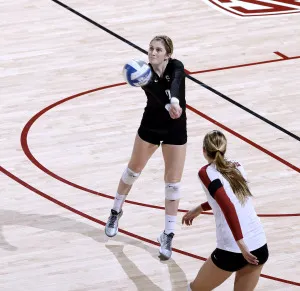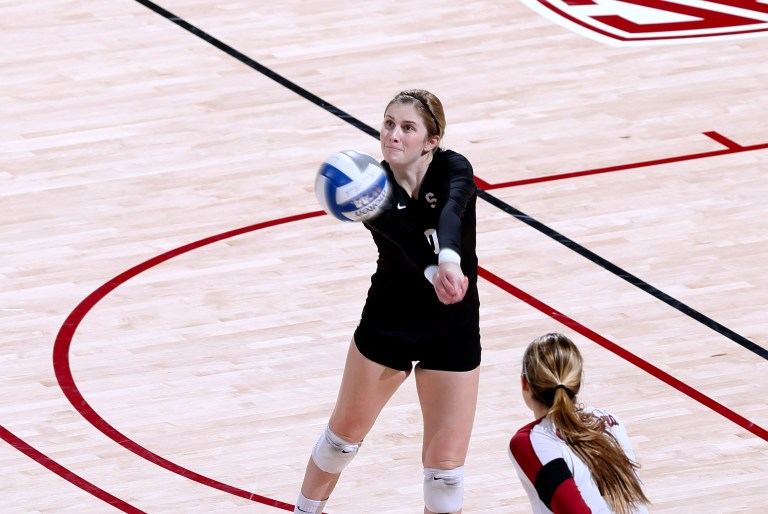Whenever Stanford and Penn State, the two most decorated programs in NCAA women’s volleyball history, have matched up over the last few years, it has usually been a dogfight. Thursday night’s national semifinal match was no different; the only thing that was missing from the script was a fifth set.
The No. 5-seeded Nittany Lions knocked off the No. 1 Cardinal in four sets, 25-16, 23-25, 25-22, 25-21, in Chesapeake Energy Arena in Oklahoma City, ending Stanford’s first Final Four run since 2008. It’s the second consecutive season in which the Lions have ended the Cardinal’s championship hopes — they also did in that 2008 season with a three-set sweep of Stanford in the season’s final match.

With the victory, Penn State clinched a berth in the national championship match against BYU, as they seek their seventh national title, which would break a tie with Stanford atop the NCAA record books for the most all-time.
“I would like to congratulate Penn State,” said Stanford head coach John Dunning. “And I would like to say I’ve said that too many times. I’m actually tired of it. But no one should feel sorry for us.”
Stanford was coming off one of its best matches of the year against Florida, in which it played almost flawlessly, hitting .407 as a team, its highest mark since before conference play. The difference between that regional final match and Thursday’s semifinal was almost night and day: The Cardinal attackers were held to a .207 hitting clip by the Penn State defense, their lowest percentage of the season.
It was undoubtedly a different Lions team that lost in five sets to the Cardinal at Maples Pavilion back in September. Over the season’s first couple of weeks, Penn State was still adjusting to the losses of three players who had combined for 10 All-American honors over their careers. But the Lions were the nation’s hottest team entering the Final Four, boasting an 18-match winning streak and having dropped just one set out of 52 since Oct. 18. They clearly came into the semifinal with a game plan to limit Stanford’s kills per set leader and native Oklahoman Inky Ajanaku, and to set the pins extensively to avoid the Cardinal’s big block, especially sophomore middle blocker Merete Lutz.
“Inky and Lutz are really good and both of them are hitting over .400,” said Penn State head coach Russ Rose. “That’s a veteran team, and we really knew that we had to battle in different positions and try and get some points at certain times.”
“They did a good job having a good block and knowing what to do against each of our hitters,” Lutz said. “But, I mean, we practiced against that kind of stuff every day. And we know where to find holes, where to go. I guess we just didn’t do it as well as we had hoped.”
Stanford was never able to get into a rhythm to take advantage of its deep and balanced offense that enabled their success this season, namely a program-record 33 wins. Passing proved difficult against the best serving team in the nation in Penn State, which averaged 1.96 aces per set entering Thursday. That’s not to mention the serve of AVCA National Player of the Year and another Oklahoman native Micha Hancock, who accounted for more than half of those aces with a 1.03 per set average herself.
“You build the system and it becomes dependent upon things. And that’s clearly the case,” Dunning said. “We let things get away from us in game one and it kind of changed some things, the way the rest of the match went.
“That’s too bad for us. You have to put pressure on people and if you don’t, then they’re going to just go for it. And Penn State’s pretty good at that.”
Stanford’s rough start in the first game essentially set the tone for the rest of the match, as the Cardinal consistently seemed to be on their heels. The Lions jumped out to a quick 5-0 lead, with four points coming on Hancock’s killer serve. Dunning called an early timeout to stop the bleeding and refocus his team before the set got completely out of hand, and the Cardinal responded accordingly with five straight points to tie the score at five, fist pumps abounding.
But Penn State went on to open an insurmountable lead late in the set that grew to 18-11 before they closed it out, 25-16. Lions junior outside hitter Megan Courtney played a huge role throughout the match, but particularly in the early sets, as she tallied six kills in the first frame and seven in the second. Courtney finished with a match-high 23 kills on 56 attempts for a .321 hitting percentage while also recording five blocks.
The Cardinal have become all too familiar with Courtney’s strong attack, as she had 18 kills and five blocks in the team’s first matchup with Penn State earlier this season.
Asked whether it’s safe to say she likes playing Stanford, Courtney answered simply, “Yeah. Yes, I do.
“There’s a big tradition of Penn State‑Stanford, and it goes way back further than any of us have played. Coach has really instilled us the tradition. It’s a grind. Stanford is a great team,” she said. “Tonight it was just about the 20 girls on the team, the coaching staff, against the world, and that’s what we took it as and that’s what we did.”
Stanford battled back to win the second set, but it wasn’t without a bit of difficulty. After the teams traded points early, the Cardinal opened up a 16-11 lead after winning six of seven points. They held a seven-point lead as late as 21-14, but that’s when the Lions won eight of the next nine points to tie the score at 22. Courtney had three kills in that stretch, but more worrisome for the Cardinal was that Ajanaku was blocked three times in a four-point span as Penn State shifted their blockers toward the middle.
While Stanford was able to close the set and even the match at one, Ajanaku’s troubles highlighted the challenges the Cardinal faced all night in avoiding the Lions’ defense. Though Ajanaku finished the match with nine kills, she had a season-high seven errors over 22 total attacks, contributing to her season-low .091 hitting percentage.
The third set continued the back-and-forth affair with neither able to find a rhythm on offense. Once again, Penn State opened up an early 5-1 advantage on Hancock’s serve, but that was the largest lead either team held in the frame. Stanford battled back to take a small edge, which it held until 18-16. But four straight Penn State points put the Nittany Lions back up 20-18 late in the all-important third set.
Stanford closed to within one point on four separate occasions after that, even as late as 23-22 after a pancake save from senior libero Kyle Gilbert was followed up by a kill from junior outside hitter Brittany Howard, saving a potential match point opportunity for the Lions. But Penn State took the next two points to win the set and take a 2-1 advantage on a kill from Courtney and then on an error from junior setter Madi Bugg on a ball that hovered over the net.
“We came in knowing it was going to be a fight. And they did a great job,” said senior opposite hitter Morgan Boukather. “We could have done better. I know we made a lot of errors ourselves. But otherwise, it’s what we expected and we just didn’t respond the way we wanted to.”
Penn State closed out the match in the fourth set after climbing back from an early deficit. The Cardinal tried to will themselves back, with Ajanaku providing the most demonstrative fist pumps and shouts of “let’s go,” but were never able to gain any momentum. Stanford closed to within one point at 20-19 and 22-21, but the team was caught with its weaker rotation on the floor and Ajanaku on the bench for the match’s most consequential points. The Lions won the final three points of the set, clinching their spot in Saturday’s national championship match.
Howard finished with a team-high 13 kills on a .324 hitting percentage, while Lutz and junior outside hitter Jordan Burgess recorded 10 kills each. Penn State freshman outside hitter Ali Frantti recorded 16 kills on a .375 hitting percentage.
While the semifinal loss leaves Stanford short of its goal of winning a national championship, the season was far from a failure, as the team went on an unprecedented run of 28 consecutive victories to start its regular season. All season the Cardinal were driven by their offensive depth, which came from some unexpected sources.
Boukather, in her first full season as a regular starter, was one of those breakout performers. She made the loss of outside hitter Rachel Williams ’14 almost unnoticeable, as she averaged 2.52 kills per set and was ultimately honored as an honorable mention to the AVCA All-America teams.
“It’s been the most amazing time of my life so far. I wouldn’t trade it for the world,” Boukather said. “I saw an opportunity and I grabbed it, and I’m so happy I did, because again this has been the most amazing time. I’m really thankful for it.”
“Her season was so good you probably don’t expect it out of anyone. So to have it be her first full season where she was on the court, no one would expect it,” Dunning said. “She has a little bit of uniqueness to her in the way she plays, but more than anything else she’s a great athlete, but it comes from her heart and from her commitment to the team. She’s very special.”
Boukather’s senior classmate, libero Kyle Gilbert, also had her Stanford career come to a close on Thursday. While she was integral in the Cardinal offense as a key passer this season, she will also go down as one of the best defensive specialists in program history. Gilbert recorded her 2,000th career dig on Thursday night against Penn State, becoming just the second player in program history to reach the plateau. She finished with 2,017 career digs at the end of the match, good for second all-time for the Cardinal behind only Gabi Ailes’ 2,147.
Despite the loss of this year’s seniors, Stanford will return the nation’s most talented senior class, including three players that were honored as first-team All-Americans this season. And it’s only fair to believe that after finally reaching a Final Four, they’ll be back next year with the hunger to return and finish the job with a championship.
“This group has accomplished a lot, to go through our season to win as many matches in a row like we did and it seemed like almost every one of them was against a ranked team, was really remarkable. They didn’t make any mistakes,” Dunning said.
“When you’re playing here, I mean, you’re trying to be the best team in the country in this moment, which is really, really hard to do, and we came close. They will learn from it, because that’s the kind of group it is, and we will have a chance to be better next year because of it.”
Contact Jordan Wallach at jwallach ‘at’ stanford.edu.
